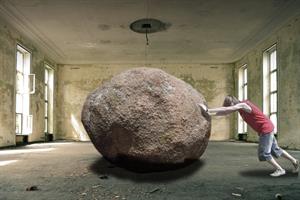PDF chapter test TRY NOW
In this section, we are going to look at,
- What is work?
- Use of the term "Work" in day to day life.
To make this point clear, let us consider a few examples.
NOT MUCH ‘WORK’ DESPITE WORKING HARD!
Consider the students are preparing for examinations. They consume a lot of time in their studies. They read textbooks, draws diagrams, organises their thoughts, collect previous year question papers, attend classes, discuss problems with their friends, and do experiments. They expend a lot of energy on these activities. In common parlance, they are working hard. All their ‘hard work’ may involve very little ‘work’ if we go by the scientific definition of work.
You are working hard to push a large rock. Let us say the rock does not move an inch despite all the effort put in by you. You get exhausted fully. But, you have not performed any work on the rock as there is no displacement of the rock.

No displacement
You are standing still for some time with a heavy load on your head. You get exhausted and feel tired. You have exerted yourself and have used quite a bit of your energy.
Have you done any work on the load?
The way we interpret the term ‘work’ in science, work is not done.

A man carrying the load on his head
You are walking through the steps of a staircase and reach the third floor of a building just to see the scene from there.
You may even climb up a tall tree.
If we use the scientific definition, the above two activities involve a lot of work.

Climbing tree
In our daily life, we recognise any useful physical or mental labour activity as work. Activities such as playing on the ground, interacting with friends, humming a tune, watching a movie, attending a function are sometimes not considered work.
What constitutes ‘work’ is based on the way we define it. We use and define the term work differently in science.
